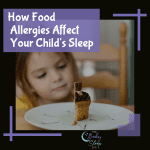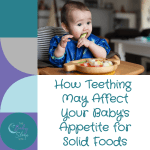
From the time your baby was born, you have no doubt been diligent about what kinds of food and nourishment goes into her mouth. From breastfeeding and/or choosing the best formula during her newborn months, to introducing healthy foods once your baby started solids, to coming up with creative and healthy meals that your toddler will actually eat – you are no doubt well-aware that what goes into your child’s body has a big impact on her health.
But did you know that your child’s meals and food choices can also have a big impact on the quality of her sleep? It’s true! Keep reading to learn how your child’s food choices, as well as the timing of her meals, can affect her nap time and nighttime sleep.
How Your Child’s Food Choices Affect Sleep
You probably know that food provides energy, so in that sense, all foods are energizing. However, you may not know that certain foods can have a stimulating effect on the brain. The most classic examples, of course, are caffeine-containing foods. Caffeine has a strong stimulant effect on the brain. Refined sugar is another classic stimulant. Both caffeine and refined sugar will make your child more alert and much less inclined to sleep. For that reason, it’s best to minimize your child’s intake of the following foods:
- Coffee and tea (both regular and decaf, as decaf contains some caffeine)
- Soda (even caffeine-free sodas, as they contain small amounts of caffeine)
- Chocolate (double-whammy: it contains caffeine and refined sugar!)
- Sugary beverages and fruit juices
- Sugary snacks and candy
However, there are other types of foods that actually have a sedating effect on the brain. They produce chemicals that promote sleepiness and relaxation. These foods that help sleep contain a substance called tryptophan.
What is tryptophan? Glad you asked! Tryptophan is an amino acid that our bodies use to synthesize proteins. Tryptophan also produces a brain chemical called serotonin from which melatonin (which is so essential for sleep that it’s named the ‘sleep hormone’) is manufactured.
Foods that contain high levels of tryptophan include the following:
- Dairy products (Cheddar, gruyere, and Swiss cheeses have particularly high amounts of tryptophan)
- Nuts
- Tofu and soy products
- Wheat and oats
- Bananas
- Green leafy vegetables
- Eggs
- Poultry (especially turkey)
But here’s the thing: in order for the tryptophan to help your child feel sleepy, your kiddo needs to eat tryptophan-containing foods alongside foods that contain healthy, complex carbohydrate foods. Why? Because carbohydrates cause the release of insulin, which helps tryptophan reach the brain and cause sleepiness.
Good examples of meals that provide the proper combination of complex carbs and tryptophan include:
- Turkey with sauteed greens
- Whole-wheat pasta with some cheddar cheese grated on top
- An egg sandwich on whole wheat bread and topped with swiss cheese
- Tofu with stir-fried vegetables
- Tuna with brown rice
How The Timing Of Your Child’s Meals Impact Sleep
It’s not just what your child eats that has an impact on sleep; WHEN your child eats has a real effect on how well your child sleeps.
Here are a few meal-scheduling tips designed to ensure that your child sleeps well and isn’t kept awake by an ill-timed meal or snack:
- Avoid large meals 1 hour or less before bedtime. A large meal will raise your child’s metabolic rate and body temperature, which will make it tough to get to sleep. You want your child’s metabolism and temperature to be decreasing as they head towards bedtime, not increasing.
- Your child’s largest meal of the day should happen at midday. Dinner should be a bit smaller than lunch and should happen at least 2 hours before your child’s bedtime.
- A small snack before nap time or bedtime can be a great idea; just be sure it’s healthy and doesn’t contain refined sugar or caffeine. In addition, offer the snack about 30 minutes before your child needs to go down for sleep.
Remember, food choices and meal-timing won’t fix persistent sleep problems. If your child is taking short, inconsistent naps and is struggling to sleep through the night, you will likely need to try sleep coaching in order to see improved sleep. But feeding your child the right foods and timing up meals carefully can certainly help to enhance already-strong sleep habits.








